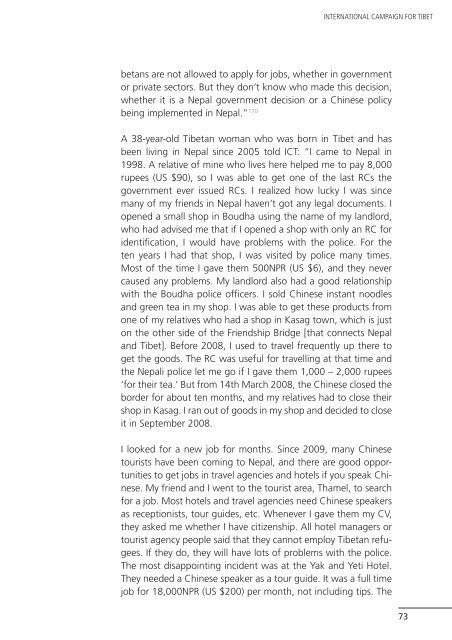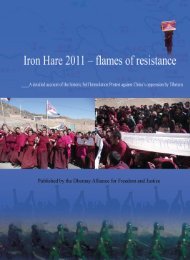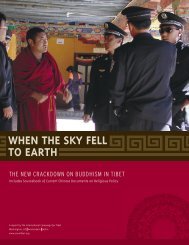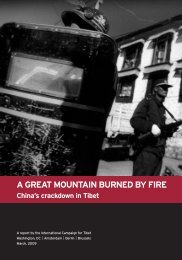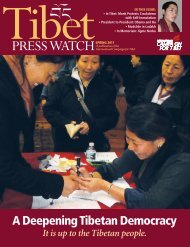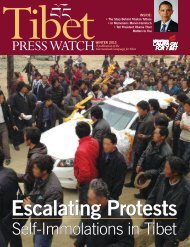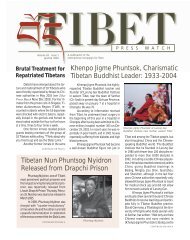DANGEROUS CROSSING: - International Campaign for Tibet
DANGEROUS CROSSING: - International Campaign for Tibet
DANGEROUS CROSSING: - International Campaign for Tibet
You also want an ePaper? Increase the reach of your titles
YUMPU automatically turns print PDFs into web optimized ePapers that Google loves.
INTERNATIONAL CAMPAIGN FOR TIBET<br />
betans are not allowed to apply <strong>for</strong> jobs, whether in government<br />
or private sectors. But they don’t know who made this decision,<br />
whether it is a Nepal government decision or a Chinese policy<br />
being implemented in Nepal.” 170<br />
A 38-year-old <strong>Tibet</strong>an woman who was born in <strong>Tibet</strong> and has<br />
been living in Nepal since 2005 told ICT: “I came to Nepal in<br />
1998. A relative of mine who lives here helped me to pay 8,000<br />
rupees (US $90), so I was able to get one of the last RCs the<br />
government ever issued RCs. I realized how lucky I was since<br />
many of my friends in Nepal haven’t got any legal documents. I<br />
opened a small shop in Boudha using the name of my landlord,<br />
who had advised me that if I opened a shop with only an RC <strong>for</strong><br />
identification, I would have problems with the police. For the<br />
ten years I had that shop, I was visited by police many times.<br />
Most of the time I gave them 500NPR (US $6), and they never<br />
caused any problems. My landlord also had a good relationship<br />
with the Boudha police officers. I sold Chinese instant noodles<br />
and green tea in my shop. I was able to get these products from<br />
one of my relatives who had a shop in Kasag town, which is just<br />
on the other side of the Friendship Bridge [that connects Nepal<br />
and <strong>Tibet</strong>]. Be<strong>for</strong>e 2008, I used to travel frequently up there to<br />
get the goods. The RC was useful <strong>for</strong> travelling at that time and<br />
the Nepali police let me go if I gave them 1,000 – 2,000 rupees<br />
‘<strong>for</strong> their tea.’ But from 14th March 2008, the Chinese closed the<br />
border <strong>for</strong> about ten months, and my relatives had to close their<br />
shop in Kasag. I ran out of goods in my shop and decided to close<br />
it in September 2008.<br />
I looked <strong>for</strong> a new job <strong>for</strong> months. Since 2009, many Chinese<br />
tourists have been coming to Nepal, and there are good opportunities<br />
to get jobs in travel agencies and hotels if you speak Chinese.<br />
My friend and I went to the tourist area, Thamel, to search<br />
<strong>for</strong> a job. Most hotels and travel agencies need Chinese speakers<br />
as receptionists, tour guides, etc. Whenever I gave them my CV,<br />
they asked me whether I have citizenship. All hotel managers or<br />
tourist agency people said that they cannot employ <strong>Tibet</strong>an refugees.<br />
If they do, they will have lots of problems with the police.<br />
The most disappointing incident was at the Yak and Yeti Hotel.<br />
They needed a Chinese speaker as a tour guide. It was a full time<br />
job <strong>for</strong> 18,000NPR (US $200) per month, not including tips. The<br />
73


